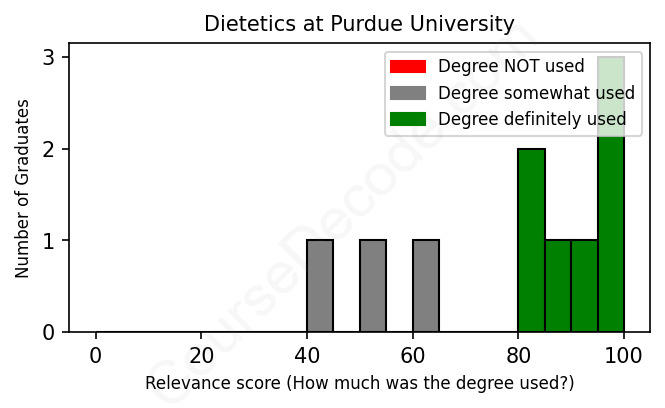
First, some facts. Of the Dietetics graduates from Purdue University we've analyzed , here's how many have used (or NOT used) their degree in their career:

These are estimates based on AI analysis of 10 LinkedIn profiles (see below).
The verdict? Significantly above average. Overall, with an average relevance score of 79%, Dietetics graduates from Purdue University have a much higher likelihood (+12%) of finding work in this field compared to the average graduate across all fields:
And for comparison, here's the chart for all profiles we've looked at across all degrees.
Also, after graduating, 90% of these graduates have pursued further education other than another Bachelor's degree (such as a Masters degree or other), compared to the average across all profiles of 35%. This suggests you may need more than just a Bachelors degree to be competitive as a Dietetics graduate.
See the details:
|
Relevance score: 64% We think this person has gone into a career only somewhat relevant to their degree. We think this person has gone into a career only somewhat relevant to their degree.
DEGREE INFOGraduated in 2011 from Purdue University with a Bachelor of Science (BS) in Dietetics. Also pursued further education since (see below). JOB HISTORY SINCE GRADUATIONDietetic Intern IUPUI Aug 2011 - Jun 2012 Clinical Dietitian  Community Health Network Sep 2012 - Jun 2017 Swim Coach  Noblesville Swim Club May 2011 - Present FURTHER DEGREES DONE SINCE GRADUATINGDietetic InternshipIndiana University-Purdue University at Indianapolis 2011 - 2012 ABOUTNo information provided. |
The top 10 most common jobs done by the graduates we've analyzed (ranked most common to least) are:
When checking out the career paths of folks from Purdue University who studied Dietetics, it’s pretty clear that many of them dive straight into roles that are very much connected to their degree. A lot of them end up as Registered Dietitians, Clinical Dietitians, or Nutritionists, which makes total sense because these jobs really need the specialized knowledge they gained during their studies. For instance, positions like Pediatric Endocrinology and WIC Nutritionist are all about applying dietetic principles to help people with their nutritional needs, showing a strong relevance to their education.
That said, not every job on this list screams "Dietetics!" Some graduates stretch their skills into roles like swim coaches or sales professionals in nutrition products, where the dietetic knowledge is just a bonus rather than a necessity. These positions might include some general health awareness, but they aren't the main thrust of the job. Overall, it seems like a good number of graduates stick to related fields, but there’s also a mix of roles that don't directly utilize the specialized skills from their degree. So, while there’s a solid foundation in dietetics for many, some definitely take a detour into unrelated territory!
Here is a visual representation of the most common words in job titles for Dietetics graduates (this is across all Dietetics graduates we've analyzed, not just those who went to Purdue University):

The career trajectories of graduates from Purdue University's Dietetics program seem to show a pretty solid alignment with the field of dietetics. Typically, many of these graduates land their first jobs as clinical dietitians or in roles connected to dietetic internships. For instance, graduates from 2011 started out as clinical dietitians or dietetic interns, which is pretty common. As they gain experience, many transition into more specialized roles like pediatric nutrition or even consulting, especially seen in profiles from the 2011 and 2013 cohorts. It looks like they're starting in strong positions and moving up within the healthcare field, which is promising!
Five to ten years down the line, most graduates are still closely tied to dietetics, serving in various capacities from clinical dietitians to nutrition specialists and even some teaching roles at universities. While some ventured into related fields like wellness consulting or sales, there's still a significant number who stick with clinical positions or specialized dietary roles. The overall impression is that these graduates are forging successful careers and making a positive impact in the nutrition and healthcare sectors, with very few veering off into unrelated fields. It's a solid path for anyone interested in dietetics!
Honestly, pursuing a Bachelor’s degree in Dietetics, whether at Purdue University or elsewhere, can be pretty challenging. It’s definitely more demanding than some other degrees because you’ll dive deep into subjects like nutrition science, microbiology, and chemistry, along with practical work and internships. You’ll have to balance coursework, labs, and sometimes even community projects, so it can feel like you’re juggling a lot. If you’re passionate about food and health and you're ready to put in the effort, it’s totally doable, but it’s not a walk in the park. So, if you’re looking for something more on the easy side, you might want to think twice about this one!
Most commonly, in the LinkedIn profiles we've looked at, it takes people 4 years to finish a Bachelor degree in Dietetics.
Looking at the job histories of these Purdue Dietetics graduates, it seems like most of them have carved out pretty solid careers for themselves. They started off in various clinical and internship roles, which are standard stepping stones in the field, and many made their way into registered dietitian positions, which generally offer decent salaries. The ones who transitioned into roles such as clinical dietitians, pediatric dietitians, and even sales positions seem to be doing well, at least compared to entry-level jobs. It’s also notable that they’ve landed roles in reputable health organizations and even taken on some leadership positions over time. Overall, while I can't say for sure how much they each make, the trajectory looks promising, especially in the healthcare sector where dietitians are valued. So yeah, they've probably made a decent living!
Here is a visual representation of the most common words seen in the "about" section of LinkedIn profiles who have a Bachelor degree in Dietetics (this is across all Dietetics graduates we've analyzed, not just those who went to Purdue University). This may or may not be useful:

Here are all colleges offering a Bachelor degree in Dietetics (ordered by the average relevance score of their Dietetics graduates, best to worst) where we have analyzed at least 10 of their graduates:
| College | Score | Count |
|---|---|---|
 University of Delaware University of Delaware
|
87 | 13 |
 Purdue University Purdue University
|
79 | 10 |
 University of Kentucky University of Kentucky
|
76 | 10 |
 Michigan State University Michigan State University
|
74 | 16 |
 Brigham Young University Brigham Young University
|
73 | 12 |
 Iowa State University Iowa State University
|
72 | 13 |
 Florida State University Florida State University
|
67 | 11 |
 Arizona State University Arizona State University
|
65 | 12 |